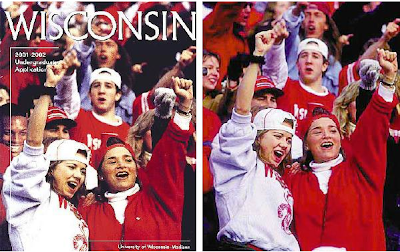Today
in class we started discussing about "TV
Tokenism" which, for those of you who don't know, is the unofficial
requirement to have an equally diverse cast of actors on any given TV show. But
tokenism doesn't just appear in TV. I've noticed more "diverse" ads,
magazines, and health pamphlets just with in the past 12 hours.
I
decided to do some digging on the Internet to uncover more examples of clearly
forced portrayals of diversity, and came across a 2001 undergraduate
application for the University of Wisconsin- Madison.
 The
picture on the right is the original
picture taken at a university football game, but the picture on the left
features an African American student (far left) that was not featured in the original photograph.
The
picture on the right is the original
picture taken at a university football game, but the picture on the left
features an African American student (far left) that was not featured in the original photograph.
I
didn't think an acclaimed university would actually alter a photograph solely
to appear more diverse to perspective students, but apparently, I was wrong!
According to Snopes.com,
the urban myth busting website, this rumor is TRUE. The African American student
shown in the university application was photo shopped in after the picture was
taken.
I'm
not naive. I understand that tons of institutions stage photos to appear
diverse, but why have we made the jump from being
truthful about our lack of diversity to staging fake diversity? I'm sure
there are students of color at the University of Wisconsin, but why go the
extra mile to appear more diverse then they actually are? Now I may be over
thinking this, but doesn't it seem more
racist to consciously insert a minority figure than it is to just use the
original photo for what it is?

